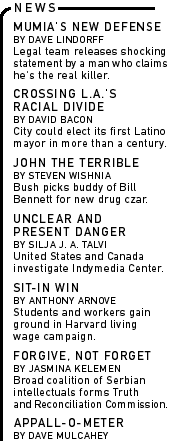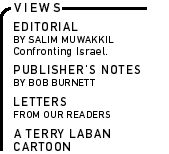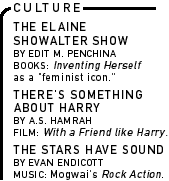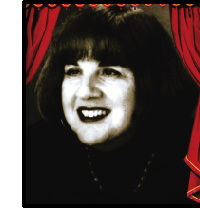

|

|

|

|
|
|
| |
|
|
|
Inventing Herself: Claiming a At the start of Elaine Showalter's career, by her account, she had her head "at least in some of the right places at the right time." Her first book, A Literature of Their Own, argued for a separate female canon, finding a niche that was to grow into an academic field. She was poring over literary texts by women before there was such a thing as feminist literary criticism, let alone a discipline called "women's studies." She was a pioneer, a trailblazer. So why has Showalter, who began by working in the stacks, throwing life vests to unknown women writers in an attempt to recover their names for posterity, now turned her pen toward names like Oprah Winfrey and Princess Diana? That turn parallels a career move out of the library and into the limelight. Now Avalon
Foundation Professor in the Humanities and Professor of English at Princeton University, coming off a stint as president of the Modern Language Association, Showalter is content and living comfortably, commuting between her New Jersey home and her London flat. (Anglophile that she is, she even married a guy named English.) She frequently reviews and writes for the Guardian, the Observer and the Times Literary Supplement. She has played TV critic for People and written and presented for BBC radio and television. She writes about what she wants to write about, says what she thinks, consequences be damned--an attitude some would expect of a woman who has been called "Camille Paglia with balls," but one which has led others to want her head on a platter. When Showalter "came out of the closet" about her "passion for fashion" in the pages of Vogue a few years ago ("For years, I have been trying to make the life of the mind coexist with the day at the mall"), she recounts: "I was attacked by academic radicals as the Marie Antoinette of the MLA whose answer to the sweated and unemployed must be 'Let them wear Prada.' " Her defense: "Despite my notoriety as the Prada Queen, my only Prada had been a counterfeit handbag (with triangular logo) bought from a street vendor outside Bloomingdale's for $30." Touché. Struggling to keep their belts off their bones, unemployed Ph.D.s and angst-ridden graduate students tensed when, in her first "President's Column" for the MLA newsletter, Showalter suggested they get schooled for life outside the Ivory Tower. Her answer to the crisis plaguing the humanities--a scant third of graduate students find tenure-track jobs within a year of finishing--placed the onus on literature students to "learn to write well enough to get paid for it" and doctoral programs to provide training in skills of use not only to future professors but to other varieties of working stiff. Hers was a pragmatism in the face of the academic job market that many, particularly those in the MLA's Graduate Student Caucus, were not ready to hear. "Ms. Showalter is a professor at a prestigious university who would rather be a journalist now," outgoing Caucus president Laura Sullivan told the New York Times in 1999. "Well, we haven't gotten there yet." "Elaine is making more money at Vogue than at Princeton," Professor Cary Nelson quipped. "When she brings a Hollywood scriptwriter to dangle in front of graduate students at the MLA, they have every right not to feel this is manna from heaven. Offering them an alternative career is a slap in the face." Outside the academy, responses to Showalter's Hystories, a project she undertook under the aegis of literary critic and historian of medicine, rendered her first book tour a saga worthy of a made-for-TV movie. As a result of venomous responses to the book's overarching thesis, which labeled various syndrome sufferers, alien abductees and purported victims of satanic ritual abuse "hysterical," Showalter had to be escorted by armed guard from store to store, studio to studio. She became the first guest on the Mary Matalin Show to provoke hate mail before her appearance. (Off the air, the two compared nail polish.) She was called "Nazi" and "maggot." "You evil, destructive woman," said a therapist with whom she had just appeared on a talk show, "just wait." Still, despite the threats, and the premonition of her friend Joyce Carol Oates that Showalter would be "assassinated," she survived--and had the publicity to show for it, with magazines from Lingua Franca to Mirabella running lengthy profiles. What did it mean that a feminist was writing about her love of fashion? Why should graduate students ponder careers in new media or screenwriting? What was Elaine Showalter doing on Rolonda? Had she sold out? Considering Showalter's argument in Hystories that "infectious epidemics of hysteria spread by the stories circulated through self-help books, articles in newspapers and magazines, TV talk shows and series, films, the Internet, and even literary criticism," one might think her promotional use of those same media odd. That oddity, though, may speak to Showalter's most astute comment on the changing face of feminism in the information age. "We can use the media to fight rumors as well as to spread them, through op-ed pieces, magazine stories, TV documentaries, and books," she theorized in Hystories. "TV talk shows and self-help literature are easy targets for scornful intellectuals, but they reach and teach a wide audience, largely female, that cannot always afford or manage other forms of counseling." So Showalter applauds Oprah Winfrey for her book club, her magazine and her new woman-oriented cable venture Oxygen. So Showalter wrote for People. So she consumes the stuff of Entertainment Weekly, Vogue, Tatler and In Style. If the magazines on Showalter's coffee table are more akin to those at the hairdresser's than what you'd expect from a tenured member of Princeton's faculty, it may well reflect an ultimately mass-oriented and "small-d" democratic impulse. Or not. Showalter's life as a feminist activist ended three decades ago. Her politics are liberal, of the bourgeois individualist stripe. Feminist theorist Toril Moi made this same observation about Showalter's academic texts some years ago. It still holds, and has wormed its way into Showalter's mainstream work. Seduced (metaphorically) by Bill Clinton, Showalter once met the former president at a taping of his weekly national radio broadcast. (Her daughter, Vinca, was a speechwriter in his administration.) Recalling the event in a recent piece for the Observer headlined "The Clinton Years: How Was He for You?" Showalter describes Bill as a veritable Vishnu: "In our photograph, he seems to have one arm around me, another arm around my husband, and a third around our daughter." She adds, "I am beaming." Showalter finds Mrs. Clinton no less attractive. In a report for the Guardian on Hillary's interview in the premiere issue of Tina Brown's Talk, Showalter treated the opportunistic wife as an amiable model for feminist practice: I like Rodham Clinton's gutsy refusal to shed tears, falter in public or show weakness. I like her feisty and tolerant admission that Bill was always "a hard dog to keep on the porch." I support her decision not to abandon a long-term marriage. ... This is the voice of a woman ... able to balance the personal and the political. ... The feminism of the '70s said women should walk away from cheating guys and never look back. Well, Hillary is doing something far more radical; she's going to forgive. This paragraph works its way into Showalter's latest book, Inventing Herself, with an interesting revision of the last line. "The feminism of the nineties may look pious," Showalter writes, "but I think it's really pragmatic." As if the radical and the pragmatic are interchangeable, Showalter supports any woman who has risen to position on the public stage. She applauded Natasha Walter's The New Feminism for, in turn, praising Margaret Thatcher as "the great unsung heroine of British feminism." Showalter's prose blazed: "It is about time that a young British feminist stood up for Thatcher, and Walter's defiant comments about women embracing power and realizing 'how many good things can be built with dirty hands, covered with the grit of determination and the oil of money' should be written on the skies above Oxbridge and London." Thatcher's career as British prime minister was a fine first for women, sure, but is old-boy power in pearls the kind of power feminists ought to embrace? A woman is a woman is a woman, Showalter seems to say, as if we're all sisters in the same suprapolitical sorority. On Barbara Bush, our new "First Mum," Showalter writes: "In a new century where the standard for female perfection is constantly rising, and women now publicly excoriate themselves for wearing a size in the double digits, her cheerful acknowledgement of her figure flaws and jokes that she was born weighing 135 pounds seem doubly endearing." Is this a backhanded compliment or not? More importantly, what's with Showalter's celebrity focus? To write about already celebrated figures is, of course, to guarantee interest from an already established audience. The editors of People know this. So do the Brits who turn to Showalter as that "mediagenic American feminist" who can give them the inside angle on the other side of the Atlantic. Then there's the possibility that Showalter feels the time has come for her to enter the celebrity ranks herself. Marketed as a provocative undertaking "certain to spark controversy" and that lays claim to a "feminist intellectual heritage," Inventing Herself breezes from Mary Wollstonecraft to Diana, Princess of Wales. Mary McCarthy makes an appearance, as does Hannah Arendt (who would have hated appearing in a women-only volume). Simone de Beauvoir enters in her turban. Then, folded between Susan Sontag, Germaine Greer and Camille Paglia (the one without balls?), appear first-person tales of Showalter's past, making statements on how we judge the life of a "feminist icon" that seem to double as statements on how we ought to judge the life of Elaine Showalter. What kind of feminist icon is she? Perhaps we might turn to Showalter's
own words: "the heroine, at best, of a screwball tragedy"--a tragedy
in which a pioneering spokeswoman for the great unknown winds up
striking a Faustian bargain for a byline. Edit M. Penchina is a graduate student in political science at Johns Hopkins University. Her e-mail address is empenchina@yahoo.com.
|


